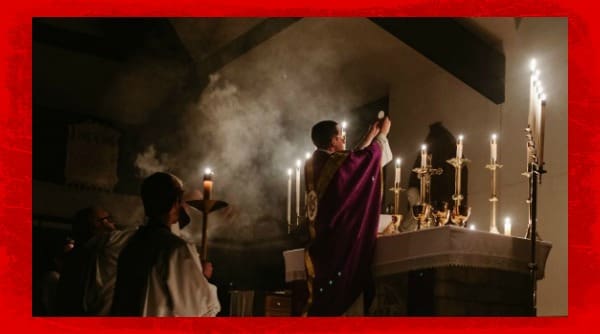Editor’s note: This article is part 8 of a series, “The Kingdom of Grace.” Part 7 can be found here.
When many people hear the word charity, the first thing that comes to mind are various works of mercy such as soup kitchens, shelters, and orphanages. All such things are outward works of charity indeed, but the essence of charity is friendship with God.
It is impossible for human beings to be or to become personal friends with God by our own natural strength. Friendship with God can only be a gift of his grace. Friendship with God is something altogether beyond us – something supernatural. In our baptism, however, the grace of just such a personal friendship with God is given to us.
Scripture tells us that charity or friendship with God is the principle thing in the spiritual life (1 Cor. 13). The journey from the land of our bondages to our home in the heavenly places is essentially the unfolding of a friendship with God.
The friendship given to us by grace is first of all interior. The friendship is planted in the depths of our souls. It unfolds both inwardly and outwardly, in the depths of the heart and in outward behavior, over the course of a lifetime. It unfolds through God’s action and our actions. The friendship unfolds in actions of increasingly greater intensity and immensity, and as the journey continues the friends of God normally become increasingly more amazed at what God is doing in them. They become amazed at the riches of grace God planned to give them from before the foundation of the world.
From before the foundation of the world God has created us and called us to go into the Light, and as the journey of our friendship with God continues the first installments – the down payments – of our inheritance with the saints in Light becomes increasingly greater.
Charity, or friendship with God, is a great mystery indeed, but human friendships provide an obvious model or analogy for purposes of understanding and living in friendship with God. Let us consider a few examples.
Friends live together. It is an ordinary part of friendship that the friends want to be together and remain together. So, too, it is in our friendship with God. Thanks to the grace of charity, we live together with God in the depths of our hearts. For the Spirit himself has come to dwell within us: “you know him, for he dwells with you and will be in you” (Jn. 14:17). We also want to stay with God. What did the disciples on the road to Emmaus say to the Lord as he was about to travel on? “Stay with us” (Lk. 24:29).
Friends converse together. What would a friendship with someone be without an ongoing conversation? So, too, it is in our friendship with God. Thanks to the grace of charity, we converse with God. For the Spirit of truth “will teach you all things and remind you of all that I told you” (Jn. 14: 26). It is normal for friends to remember one another’s words, and try to understand them. So, too, with us and the Lord. Though we live on earth, “our conversation is in heaven” (Phil. 3:20), and in that conversation, the Spirit “will teach you all things” (Jn. 14:26). In order for this conversation to deepen, however, the Lord says: “Come away with me to a lonely place” (Mk. 6:31). Why?
Friends share their secrets with one another. So, too, it is in our friendship with God. God shares his secrets with us, and we share our secrets with God. He shares his secrets with us in Scripture and tradition, and is eager to open up their lessons to us. “All that the Father has is mine,” said the Lord Jesus, and the Spirit “will take from what is mine and declare it to you” (Jn. 16:15).
The sharing of secrets best takes place in solitude and silence, for in solitude and silence the soul is lent to listening. In personal prayer and the sacrament of penance, we also share our secrets with God – especially our sins. “Come now, let us settle the matter, though your sins be as scarlet, they shall be white as snow” (Is. 1:18). “Look to him and be radiant, do not let your faces be ashamed” (Ps. 34:5).
Friends find joy and peace in one another, and we find joy and peace in God. The joy and peace of God coming to us by grace are not of this world, and even though our health or our finances or our families or our world remain afflicted in a thousand ways, the peace and joy of God dwelling in our hearts prove remarkable in their power to sustain the soul. “The Kingdom of God is not food and drink, but righteousness, joy, and peace in the Holy Spirit” (Rom. 14:17).
Friends eat together. It would be a strange friendship indeed if the two people never ate together. In our friendship with God, we eat together with God in the sacred banquet of the Eucharist. The Eucharist is not merely bread or wine. It looks like bread and wine, and tastes like bread and wine, but it is not bread and wine.
Rather, the fire of the Holy Spirit working through the words of the priest transforms what at first is bread and wine into the very body and blood of Christ. Those who come forward to receive holy communion receive him – Jesus Christ – who gives himself to us in the sacrament of the altar.
Friends also work together for the same purposes, and we work together with Christ for the salvation of the world. In all our Christian works, we are “coworkers in the Truth” (3 Jn. 1:8), but in the Mass our status as coworkers reaches a certain height. For Jesus Christ offered himself to the Father through the Holy Spirit on Calvary (Heb. 9:14), and even until now Jesus Christ continues to offer himself to the Father through the Holy Spirit in the heavenly places. At the same time, Jesus Christ also now offers himself to the Father in an unbloody way, in a sacramental way, on the altar in the sacrifice of the Mass.
The mystery of Christ offering himself on Calvary, the mystery of Christ now offering himself in heaven, and the mystery of Christ now offering himself on altars around the world are all one and the same reality. It is one and the same self-offering given “for the life of the world” (Jn. 6:51). When we go to Mass, we join in the mystery of the sacrifice, and offer ourselves along with Jesus Christ to the Father for the life of the world.
In all of these ways, the supernatural friendship with God is very rich indeed. The more we ponder the ways of ordinary friendship, the more we can learn of the friendship with God we have received by grace. Slowly, the riches of charity unfold before us. One of those riches is the Name dwelling in our hearts, and that is the topic of the next article.
Father James Dominic Brent, O.P. is a Dominican Friar who lives and teaches at the Dominican House of Studies in Washington, DC. Several of his homilies, spiritual conferences, interviews, and radio spots can be found on his personal Soundcloud site. He frequently lectures for the Thomistic Institute and appears on Aquinas 101.
Image courtesy of Unsplash.




